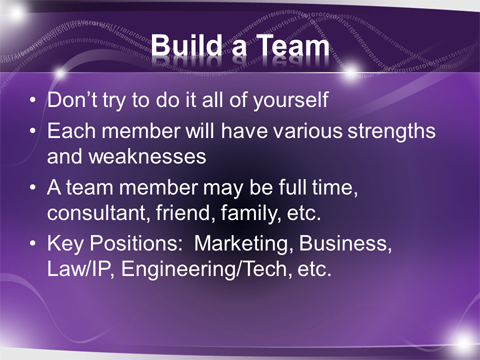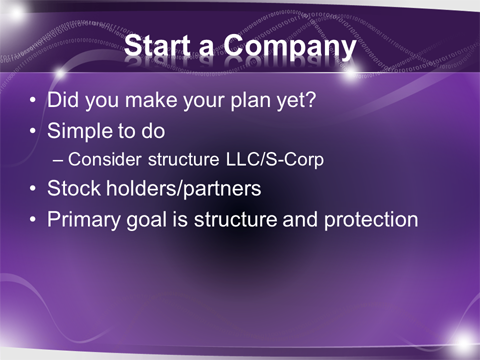
 Hope is not a plan. Fail to plan, plan to fail, there are a bunch of these phrases you should repeat to yourself. Proper planning and preparation are critical to each and every business venture. The few that pull it off are lucky or have done it many times before. Don’t count on luck. Spend the time and figure out what you are really doing here. Finances, marketing, and development are going to be your big black holes. How are you going to pay for all this? Who is going to pay for all of this? Knowing what money is going out BEFORE you have cash coming in is scary. It is a fixed resource. I’m a big proponent of figuring out what you need to do to get to the next step. You may need a million dollars to launch your product, and you only have $20K. You are going to need to get an investor. So the plan is to spend that $20K to convince an investor to give you $200K. Then use that to get to the $1M. You may only have the budget for market research, some sketches and 3D models. Make that work. Get to the next step. Also, your plan will change. Stick to the plan, but adapt the plan as required.
Hope is not a plan. Fail to plan, plan to fail, there are a bunch of these phrases you should repeat to yourself. Proper planning and preparation are critical to each and every business venture. The few that pull it off are lucky or have done it many times before. Don’t count on luck. Spend the time and figure out what you are really doing here. Finances, marketing, and development are going to be your big black holes. How are you going to pay for all this? Who is going to pay for all of this? Knowing what money is going out BEFORE you have cash coming in is scary. It is a fixed resource. I’m a big proponent of figuring out what you need to do to get to the next step. You may need a million dollars to launch your product, and you only have $20K. You are going to need to get an investor. So the plan is to spend that $20K to convince an investor to give you $200K. Then use that to get to the $1M. You may only have the budget for market research, some sketches and 3D models. Make that work. Get to the next step. Also, your plan will change. Stick to the plan, but adapt the plan as required.
Build a Team
 This is probably one of the most important steps in any business or product launch. You are not an expert in everything. You may not be an expert in anything but the idea you have. Find people to help you that believe in you. Find friends, partner with firms and consultants. Work with business associates. Find people who can help you in the spare time and possibly jump in with you if things start to go in the right direction. It is far better to have a team and share the wealth than to try to do it all on your own and increase the likelihood of failure. You need to convince a few associates to put their blood, sweat, and tears into your project, if you can’t get that done, you probably won’t be able to sell your product.
This is probably one of the most important steps in any business or product launch. You are not an expert in everything. You may not be an expert in anything but the idea you have. Find people to help you that believe in you. Find friends, partner with firms and consultants. Work with business associates. Find people who can help you in the spare time and possibly jump in with you if things start to go in the right direction. It is far better to have a team and share the wealth than to try to do it all on your own and increase the likelihood of failure. You need to convince a few associates to put their blood, sweat, and tears into your project, if you can’t get that done, you probably won’t be able to sell your product.
There are many aspects to the team. You’ll want marketing people, law/IP people, tech and engineering people, etc. It’s going to take a team. Build the core. And they all don’t need to quit their jobs and follow you. Some may be family, friends, or other professionals. I would expect a few people would be putting in time for you at night and waiting in the wings for your vision to take off, then they might be willing to quit their jobs and follow you!
Funding
An important part aspect of the business plan will be determining how you are going pay for this venture. Starting a company takes a lot of moving parts, and money will be a critical part to this. You really need to figure out how much you are willing to risk on this idea. Don’t wreck your life over starting a company. Most likely, unless you are independently wealthy or have a very high paying job, you will be looking for money from other places like investors and partners.
There are a lot of ways to raise money. In the infancy of your company, you may be looking for what is termed a ‘Seed’ or ‘Angel’ round. Seed money is the very first chunk you throw in. It’s usually all your or close friends and relatives. At the Angel stage, you’ve got a plan in place, but you need to make it to the next step. It would be great at this point if you have sales, but validation will be really important here. Have you proven there is a market, they will pay your price point, and you have a good idea what it will take to get there? The Angel (the person) will likely be a key part of your company and will likely provide a lot of guidance and maybe even a title role based on their own experience. After that you get into more serious rounds like ‘Series A’.
Keep in mind too that it is easier to raise $10M than $100k. There is a catch here though, you need to have a $100M idea. The point here is, have a big plan. Think and figure out how your company would look if it actually worth $100M? Here is the mentality to this. If a theoretical investor is willing to invest $1M in a project, he probably is worth upward of $30M. He doesn’t need to double his money; that doesn’t impress him. He wants to 10x his money. This is further compounded by the fact that lots of people have lots of ideas, and only a handful make it. So he knows that he needs to put $1M into 10 places, and that only one is maybe going to make 100x his investment.
One other key factor to consider when trying to raise money for your company. If you can’t raise money, it means one of a few things: You aren’t ready (not enough validation), it’s not a good idea, or you don’t have a good plan (or you don’t convey your plan well enough). It takes time to raise money. You have to find the right investor for your project. However, if after a year of being ready and trying, you can’t raise money, you should really consider some of the other possibilities above. And don’t just turn around arrogantly and say that they don’t know what they are talking about and try to fund the project yourself. People fund good ideas and plans; you just may not have one. Go back to the drawing board to validate and refine; or be glad you still have a day job!
Consult With Score
For some context, I originally created this presentation for my local SCORE chapter and I present it a few times a year. SCORE’s consultation with me was one of the key pivotal points which launched my company from a one man show to what it is today. I highly recommend the organization for their classes and training. They however don’t do the work for you. They are an all-volunteer organization and provide a lot of support to the entrepreneur and small business person.
If you are new to the way business works in general or have a few weak spots either starting or maintaining the various functions you will need to run your business, check them out. Depending on what you need, they will help select a mentor for you. Don’t be afraid to ask for others or more than one either. Find someone who has the wisdom you need and you work well with. If the relationship is successful, you will likely be working with them for a while.
Start a Company
 Now that you have your plans in place, you’ve consulted with SCORE and other consultants and friends, it’s time to launch your company. Now I understand that for other reasons, you may have incorporated earlier before having your full plan in place, which is OK. Some of those reasons may be to have a protective legal structure or just a place to move money around in a non-personal environment. I mean you are really starting to run and operate like a company.
Now that you have your plans in place, you’ve consulted with SCORE and other consultants and friends, it’s time to launch your company. Now I understand that for other reasons, you may have incorporated earlier before having your full plan in place, which is OK. Some of those reasons may be to have a protective legal structure or just a place to move money around in a non-personal environment. I mean you are really starting to run and operate like a company.
There are a few key types of organizations you can create, generally you are either a C or S Corporation or Limited Liability Corporation (LLC). There are lots of legal and tax reasons for each of them. I personally prefer the S Corp, but the LLC is becoming more and more common. I personally find the flexibility allowed in an LLC is not all that required or necessary. This is a good question for your lawyer. In either case, the primary reason for setting up a legal entity is separation from yourself personally and the company. Secondary reasons for a corporation are topics like allowing multiple owners, accounting, and identity.
Licensing
Perhaps after reading all of this, you determine that maybe you really aren’t ready to start a company manufacturing and selling your product idea. That’s quite OK, you can always try to license your product. Essentially, this amounts to many of the initial steps of starting your company such has validation and prototyping, but if you can find someone who wants to build and market your idea for you, you can sit back and collect checks. There are drawbacks of course, it’s not a perfect plan.
The first drawback is that you get out what you put in. You’ve taken far less risk on launching your product. You are likely to make a few percentage points on your idea. The risk was taken by the licensor who manufactured and sold your product. They will make more money on your idea than you will, and that is OK.
The second is that these agreements can get really complicated and this is where you see inventors getting taken advantage of a lot. You have an idea, you naively contact an ‘investor services’ company, and they license your idea away for a very low rate, and are not obligated to do anything with your idea. There are many reasons why they don’t move forward with it, but there is nothing you can do about it. Be careful with these agreements and get a licensing lawyer involved or someone experienced in the process.
Really the advantage is that you take much smaller risk. You may have $10,000 in your idea and patent, and that’s it! Find a good licensing deal and collect checks. And if they don’t come in, you are out $10,000 and consider yourself lucky.
